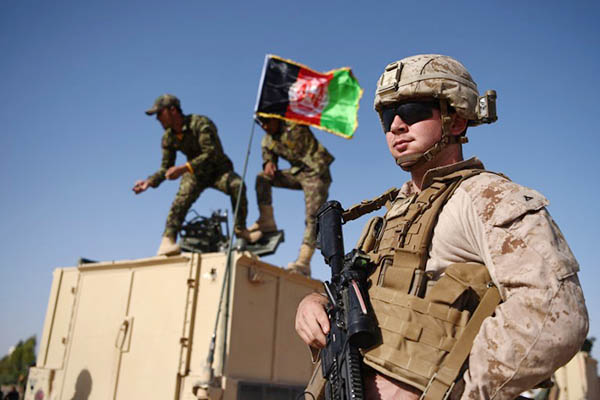
Wakil Kohsar—AFP
U.S. marines say decision for open-ended engagement gives them space and time to retake volatile region from Taliban
Marines in Afghanistan’s Helmand say Donald Trump’s decision to keep boots on the ground indefinitely gives them “all the time in the world” to retake the province, once the symbol of U.S. intervention but now a Taliban stronghold.
They may need it. At the hot, dusty Camp Shorab, where many of the recently deployed Marines train their Afghan counterparts in flat, desert terrain, the Afghans admit their army still cannot fight alone. The Taliban control or contest 12 out of Helmand’s 14 districts and continue to inflict stinging blows on Afghan forces, who have been struggling to beat back the insurgents across the country since taking the lead on security from NATO forces at the end of 2014.
Sixteen years since the American-led invasion, and after decades of near-constant war in the country, the Islamist extremists show few signs of flagging, despite being heavily out-gunned by the might of the U.S. military. With no need to pay attention to four-year election cycles, the Taliban’s fight against their technologically-superior foes is often summed up in the proverb: “You may have the watches, but we have the time.”
But Trump’s announcement that the U.S. commitment to Afghanistan is open-ended might just be enough to reverse the tide. “We have all the time in the world… to accomplish the mission the right way,” said Staff Sergeant George Caldwell, one of the Marines based at Camp Shorab.
Around 300 Marines returned to Helmand in April, a fraction of the more than 20,000 stationed in the poppy-growing province when it was the centerpiece of the U.S. invasion. Previously, they were on the frontline against the Taliban. Now they are part of NATO’s “train, advise and assist” mission, focused on making Afghan security forces strong enough to beat back the insurgents on their own.
Afghan troops are drilled in clearing insurgents from mud-brick compounds, evacuating wounded soldiers by helicopter and locating improvised explosive devices hidden in the ground. It is part of the “operational readiness cycle” launched by the Marines that takes war-weary Afghan soldiers off the battlefield for 12 weeks of training and rest.
U.S. trainers say the Afghans are making progress, retaking Nawa district in July after nine months in Taliban hands. But the insurgents are still on the offensive, carrying out a number of suicide attacks in Helmand in recent weeks.
In the province—as in the rest of the country—shockingly high casualties, along with desertions, corruption and exhaustion have eroded the morale of Afghan forces.
Major General Wali Mohammad Ahmadzai, who was appointed to lead the Afghan army’s 215th Corps in Helmand last year, said the continued U.S. support outlined by Trump was crucial. “Our army is not mature enough to fight alone,” said Ahmadzai.
In his speech last month Trump refused to offer specifics, but officials have said the additional U.S. troops could number some 4,000, on top of the 11,000-strong force already on the ground. U.S. Defense Secretary Jim Mattis said last week he had “signed orders” for the fresh deployment of troops “to enable the Afghan force to fight more effectively.” But critics have questioned what a few thousand fresh U.S. troops can do that previous forces—who numbered some 100,000 at the height of the fighting—have not.
Despite the lack of details, including any indication of how many more troops would be sent to Helmand, and when, the Marines at Camp Shorab said the fresh forces would make a difference. “What additional troops [would] give us is the capability to move faster—if you add more resources and advisers we would be able to achieve effects faster,” said Brigadier General Roger Turner, commander of the Helmand mission.
It is thought that the faster Afghan forces, who number some 330,000, can be brought to what Ahmadzai described as “maturity,” the more effective they will be against the insurgents.
Trump has refused to define the conditions for “winning,” and Turner said outright victory was unlikely—even with the extra ability. “I don’t know that they [Afghan security forces] are going to have the capacity to control every single area in the country,” he said.
More likely is an imperfect peace with the Afghan government controlling the major population centers while the Taliban hold onto rural areas—a view shared by many analysts. “This strategy only gives the [Afghan] government breathing space. It’s not a strategy for winning or defeating the Taliban,” Kate Clark, a senior analyst at Afghanistan Analysts Network, told AFP.
Others have not lost hope.
A 29-year-old Afghan commando holding a machine gun as he lay on the flat roof of a compound near Camp Shorab said “God willing” they would defeat the Taliban. “They are trying to destroy the country… we are sure we can win,” said the commando, who cannot be identified.
